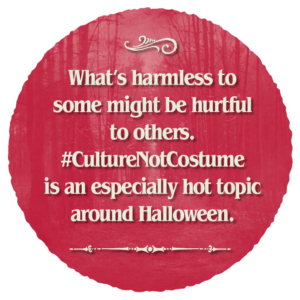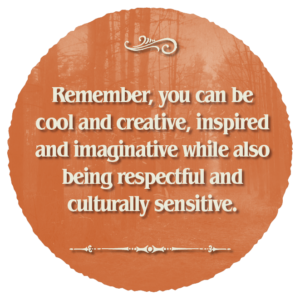Whether you’re getting together with work friends for a frightening feast, swiping sweets down your street or huddling on the sofa to watch Hocus Pocus, Halloween is a good excuse for some harmless fun and fancy dress. 
But what’s harmless to some might be hurtful to others. #CultureNotCostume is an especially hot topic around Halloween as photos of those misguided wardrobe malfunctions and questionable costume choices make the rounds on socials, sparking important debates about cultural sensitivity.
Being culturally sensitive means having knowledge, awareness, and appreciation of other cultures and cultural identities and moving through the world in a consciously kind and respectful way.
Sacred not scary
Día de los Muertos or Day of the Dead, is a sacred Mexican holiday where families welcome back the souls of their relatives who have passed away and remember and celebrate their lives. Día de los Muertos doesn’t have anything to do with Halloween, yet every year people treat it as such by appropriating the decorative masks, makeup and skull-style face paint traditionally associated it, without a second thought for its heritage or how this might impact others.
There’s nothing wrong with being creative, feeling inspired or connecting with different cultures, in fact that’s one of the wonderful things about living in our increasingly global society, but treating a culture as nothing but a costume is offensive.

Curious not cranky
It’s not that people mean to be offensive – lack of judgement usually comes down to lack of awareness – so taking time to learn is key.
The web is one of our greatest tools in gaining quick answers in a global context so next time you’re unsure, just ask Google! You might also be surprised by how much you can find out by having these kinds of conversations with colleagues, friends or people in your community.
If someone shares their cultural perspective with you, try to respond with openness and a willingness to learn – turning all the lights out and pretending you’re not home won’t work!
Acknowledgement and reflection go a long way, whether that be at work, at home or online.
Thoughtful not thoughtless
Whether you’re opting for a costume or the couch this Halloween, here are five questions to ask yourself when thinking about cultural appropriation more broadly…
- Could what I’m doing or saying be offensive?
- Do I understand the heritage or cultural context of this?
- What is this communicating?
- Who is benefitting and who is losing out?
- Who or what am I representing and why?
Remember, you can be cool and creative, inspired and imaginative while also being respectful and culturally sensitive.
By Lauren Castle
















